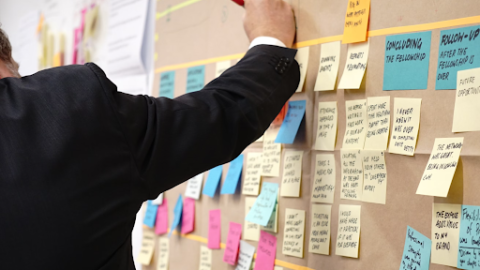The Rise of Remote Project Teams: Strategies for Effective Collaboration in a Digital Age
The traditional concept of an office, with rows of cubicles and a water cooler in the corner, is becoming increasingly outdated. Today, many companies are adopting remote work arrangements, allowing employees to work from anywhere in the world. Remote work is especially prevalent among project teams, who collaborate on complex, multidisciplinary projects that require specialized expertise. In this article, we’ll explore the rise of remote project teams and provide strategies for successful collaboration in a digital age. So, how to manage remote project teams?
Table of Contents
By the end of this post, you will be able to craft a powerful critical analysis to evaluate the advantages and disadvantages of remote work for project teams, examining its impact on productivity, team dynamics, and overall project outcomes.
Building a Strong Remote Project Team
Building a strong remote project team requires a deliberate and intentional approach. Here are some strategies for success:
Hiring and Onboarding Remote Team Members
When hiring remote team members, it’s important to look for individuals who are self-motivated, reliable, and possess excellent communication skills. However, finding the right candidate is only the first step. Once hired, the onboarding process should be thorough and include training on the company’s culture and values, as well as guidance on how to use the collaboration tools. This will help new team members feel more comfortable and confident in their roles.
Establishing Trust and Accountability
Trust and accountability are critical factors in successful remote collaboration. Team members must trust each other to complete their work on time and communicate effectively. To foster this trust, project managers should establish clear roles and responsibilities, set deadlines, and use project management tools to monitor progress.
Fostering a Collaborative Remote Culture
Creating a strong team culture is essential for any project team, but especially for remote teams that lack face-to-face interaction. Regular check-ins, team-building exercises, and social events are all essential for building a strong sense of community among remote team members.
It’s also important to celebrate successes and recognize the contributions of individual team members. This can be done through public recognition, bonuses, or other incentives. Recognizing the hard work and dedication of remote team members will help build morale and keep team members motivated and engaged.
Tools and Technologies for Effective Remote Collaboration
Effective remote collaboration requires a suite of tools and technologies. Here are some essential tools:
Communication and Messaging Platforms
Slack is a popular communication platform that allows remote teams to communicate in real time through channels and direct messages. With Slack, team members can share files, collaborate on projects, and integrate with other tools like Asana and Trello.
Microsoft Teams is another popular communication platform that offers similar features and integrates with Microsoft Office tools like Word and Excel.
Virtual Meeting and Video Conferencing Solutions
Zoom is a popular video conferencing tool that enables remote teams to connect face-to-face in real time. With Zoom, team members can share screens, collaborate on projects, and record meetings for future reference.
Skype is another popular video conferencing tool that allows remote teams to connect through audio and video calls, chat, and file sharing.
File Sharing and Document Collaboration Tools
Google Drive is a popular cloud-based storage solution that enables remote teams to collaborate on documents and files in real time. With Google Drive, team members can share files, make edits, and leave comments for others to review.
Dropbox is another popular cloud-based storage solution that allows remote teams to share files and collaborate on projects in real time.

Best Practices for Managing Remote Project Teams
Managing remote project teams requires a unique set of best practices. Here are some strategies for success:
Setting Clear Expectations and Goals
Setting clear expectations is essential for remote teams to work together effectively. Project managers should establish clear goals, define roles and responsibilities, and set a timeline for completing the project. It is also important to ensure that all team members have a clear understanding of the project’s objectives and how their work contributes to achieving those objectives. This can be achieved through regular check-ins and progress updates.
Implementing Agile Methodologies in Remote Teams

Many remote teams find success by implementing agile methodologies that prioritize delivering working software or products in short, iterative cycles, which can help keep remote teams focused and motivated.
It is important to note that implementing agile methodologies in remote teams may require some adjustments. For example, daily stand-up meetings may need to be held virtually, and team members may need to use digital tools to collaborate on tasks in real time.
Encouraging Regular Feedback and Communication
Regular feedback and communication are critical components of successful remote collaboration. One way to encourage regular communication is to establish virtual “office hours” where team members can drop in and ask questions or share updates. This can help create a sense of community and promote collaboration.
Monitoring Progress and Adjusting Strategies
Finally, project managers should use project management tools to monitor progress and adjust strategies as necessary. This enables remote teams to stay on track and adapt to changing circumstances, ensuring the success of the project.
Project managers can use tools like Trello or Asana to track tasks and deadlines. And tools like Slack or Zoom to facilitate communication and collaboration. Regular check-ins with team members can also help identify potential roadblocks and allow for adjustments before they become major issues.
Conclusion
The rise of remote project teams is transforming the workplace. As project teams become increasingly global and interconnected, the ability to collaborate remotely is becoming essential. By leveraging tools and technologies, creating a strong team culture, and implementing best practices for remote collaboration, project teams can thrive in a digital age.
Irwin Michael Reston is an expert who has more than 30 years of experience in optimizing businesses, inspiring individuals and improving human resources departments. He established the BlueLight Consulting Limited to provide learning and training service worldwide.










